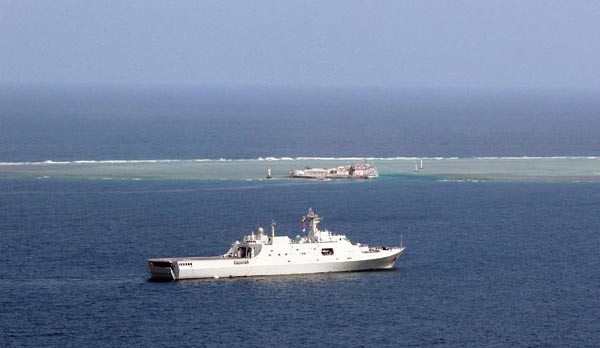 |
|
China firmly upholds her sovereignty and maritime rights and interests in the South China Sea. [Photo/Xinhua] |
Since the end of last year, the increasing involvement of more outside players has made the game of chess being played over the South China Sea issue more complicated before the upcoming China-US Strategic and Economic Dialogue.
China has become a besieged target of "legal" and "construction" battles. Vietnam and the Philippines launched legal attacks on China's nine-dash line at the end of last year. Now they have opened a new battlefront, accusing China of "illegally" carrying out construction on islands and reefs in the South China Sea.
These two countries and the United States have three main criticisms: First, the Philippines and Vietnam carried out construction only on existing islands and reefs while China is reclaiming land in violation of the Declaration on the Conduct of Parties in the South China Sea. Second, China's construction activities are affecting the water quality and coral reefs, and thus have an adverse impact on the marine resources of neighboring countries. Third, China is out to seize the strategic central zone in the South China Sea to establish air and maritime supremacy in the region, which, if not effectively contained, will intensify.
China is defending its effort with four arguments. The construction is first and foremost on humanitarian grounds, that is, to improve the living conditions of Chinese personnel stationed on the islands. Two, while China has all along followed the DOC, other countries have violated it by already building on and expanding the islands before China even started any work and, thus China's response is reasonable. Three, China's activities are lawful as the UN Convention on the Law of the Sea does not prohibit the construction of artificial islands and contains clauses on the status of artificial islands. And finally, China's construction will benefit all, because it is ready to provide facilities and security assurance for passing ships and offer necessary public goods for the region.
This is the first time that the US and other Western countries are surfing the waters of the South China Sea collectively. And the game has changed for China; from playing against several regional countries, now it is up against more international players.
The means used in the game, diplomatic battles as well as military preparations, are also evolving. Since the end of last year, most of the disputing countries have been trying to calm the situation in the South China Sea. China has proposed a dual-track approach. The Association of Southeast Asian Nations has argued strongly against its overall relationship being taken hostage. And China and ASEAN have intensified negotiations on the DOC.
The postures in the game have changed, too, from "aggressive China" to "aggressive US". The "construction battle" escalated in early May, and China's Ambassador to the US Cui Tiankai said Beijing has always followed the principle of "not attacking until being attacked" and as such there is no need for other countries to be worried about China's intentions in the South China Sea. He also said that, despite being viewed suspiciously, China is still ready to provide services for passing US ships.
US Defense Secretary Ash Carter recently said plans against Chinese construction in the South China Sea include US naval reconnaissance flights over China's islets and US vessels' patrols in waters within 12 nautical miles of the islets and reefs. In response, a Chinese Foreign Ministry spokesperson emphasized that freedom of navigation does not grant one country's military aircraft and ships free access to another country's territorial waters or airspace.
It is thus clear that like many other difficult situations in China's neighborhood, the South China Sea issue will affect China-US relations. The problem is that while China is against US intervention in regional issues, Washington insists on doing so, increasing tension, which is seen as an affront by both sides. Given these facts, the South China Sea issue will certainly be high on the agenda of the China-US Strategic and Economic Dialogue.
The author is a professor at the School of International Studies, Peking University, and eminent person and expert of ARF.
Courtesy: China&US Focus

I’ve lived in China for quite a considerable time including my graduate school years, travelled and worked in a few cities and still choose my destination taking into consideration the density of smog or PM2.5 particulate matter in the region.